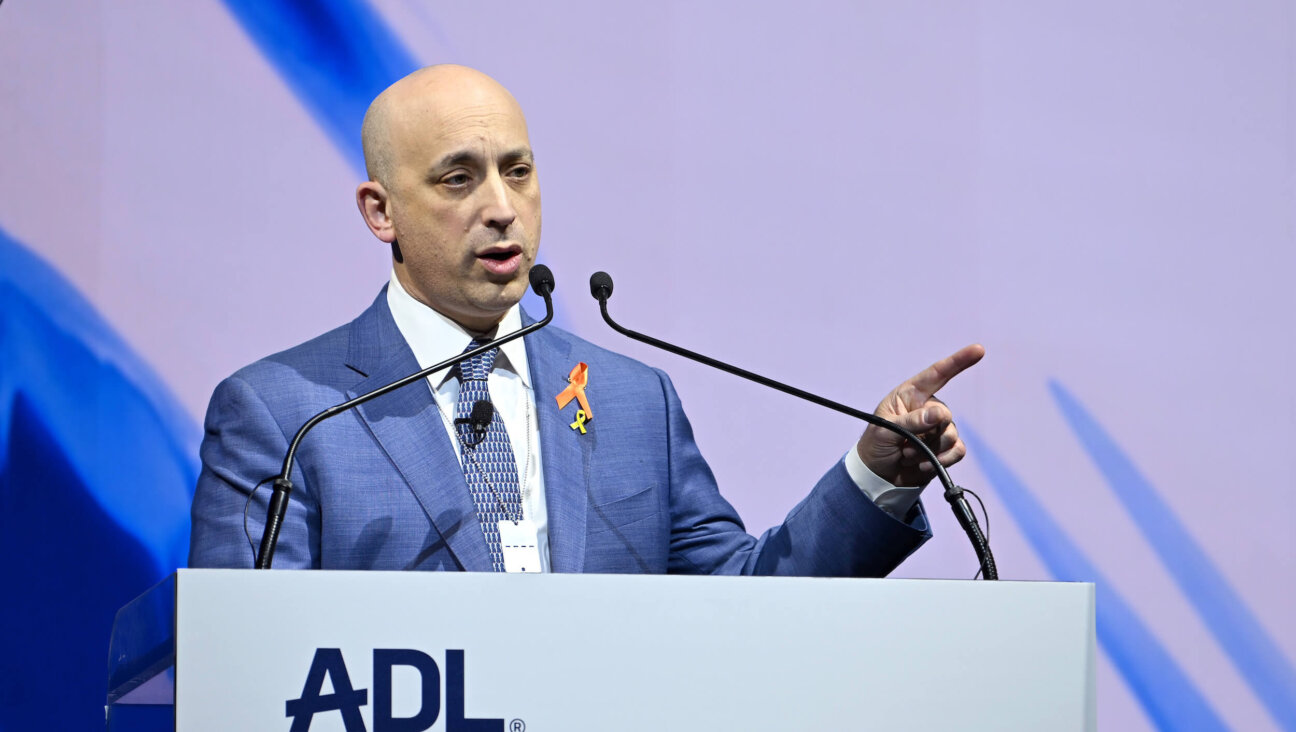Laughter is deemed essential as hospital clowns continue to work during corona

Clowns wear noses and masks on their hospital rounds. Image by Courtesy of Dream Doctors
Back when I was in high school in New Rochelle, N.Y., I would transform every Tuesday during religious school at Temple Israel into “Oscar Lasagna.” It was my clown name, which I earned by enrolling in the goofiest elective possible: Jewish medical clowning.
I went on to clown regularly in children’s hospitals, both in the United States and in Israel, after I made aliyah in 2012.
Now, as the coronavirus pandemic brings much of life to a terrifying halt, I’m stuck at home in Tel Aviv, per the Israeli Health Ministry’s directives. But other clowns in Israel have been deemed essential service providers and are operating at full capacity.

A Dream Doctor clown wears a surgical mask in the hospital. Image by Courtesy of Dream Doctors
“The key is integrating into the medical staff,” Nimrod Eisenberg, a therapy clown and creative consultant for Dream Doctors, told me.
“When Corona struck, we weren’t random clowns looking to crowd already tense wards,” he explained. “We had built lasting relationships with doctors and nurses in 29 hospitals across the country. The doctors trust us.”
As a public service during this pandemic, the Forward is providing free, unlimited access to all coronavirus articles. If you’d like to support our independent Jewish journalism, click here.
Though medical clowning doesn’t require physical contact, the contagiousness of the virus does present challenges. Facial and visual intimacy are key components of the work, so the social distancing standard six-foot separations can feel like a mile.
Eisenberg said the clowns currently operating across Israel have made adjustments. Of course there is no physical contact whatsoever with patients or medical staff. Clowns have also added masks to every costume, and are washing the costumes after every use. They are also staying in the same ward throughout a shift, rather than rotating through the hospital.

A clown stands in full safety gear outside the pediatric department. Image by Courtesy of Dream Doctors
As hospitals in the United States and elsewhere struggle with overcrowding and scramble for resources, of course, clowns have to step aside to ensure masks and other protective gear are reserved for doctors and nurses.
“For us to support medical professionals, hospital gear cannot be in short supply,” acknowledged Michael Getlan, who calls himself the “Chief Smileologist” at the Smiling Hearts Clown Squad, a non-profit group that performs medical clowning for Blythedale Children’s Hospital, Make-A-Wish of Hudson Valley, Starlight Children’s Foundation, and others. “At this particular time, I don’t know if giving up a mask for a clown is a good idea.”
But Talia Safra, who founded the group Educational Clowning in Israel in 2016, said there are other, important uses for trained clowns during this crisis.
Her group represents the first collaboration between formal clowning (almost an oxymoron) and Israel’s Ministry of Education, and now works with 19 schools across Israel, focusing on students who face emotional and social difficulties.
“Now that students are out of school, many of our interactions have continued digitally,” Safra said. “Personalizing videos has been a hit. As a child, it feels great to be told: ‘I made this video especially for you.’”

Virtual clowning for students and teachers; text reads, “Beloved students and teachers, I miss you.” Image by Courtesy of Educational Clowning
Some kids are home wondering how they can spend their days, so Safra created a fast motion video of herself passing the time. This way, the kids can laugh at what may otherwise make them feel insecure.
Since Israel went into lockdown, one of the children Safra worked with regularly experienced the death of a parent. She said she started a game of voice-note ping-pong with the student, imitating the noise of a ping-pong ball. It went on for hours.
Eisenberg, who has continued to clown at Dana Children’s Hospital in recent weeks, thinks a medical crisis like the one we are currently in is actually a critical time for clowning.
“We aim to lighten the load during otherwise unpleasant situations,” he said. “As much as we’re here for the sick, we’re also here for the staff, painting smiles on nurses’ masks and providing the perfect amount of distraction.”
The Forward is free to read, but it isn’t free to produce

I hope you appreciated this article. Before you go, I’d like to ask you to please support the Forward.
At a time when other newsrooms are closing or cutting back, the Forward has removed its paywall and invested additional resources to report on the ground from Israel and around the U.S. on the impact of the war, rising antisemitism and polarized discourse.
Readers like you make it all possible. We’ve started our Passover Fundraising Drive, and we need 1,800 readers like you to step up to support the Forward by April 21. Members of the Forward board are even matching the first 1,000 gifts, up to $70,000.
This is a great time to support independent Jewish journalism, because every dollar goes twice as far.
— Rachel Fishman Feddersen, Publisher and CEO
2X match on all Passover gifts!
Most Popular
- 1

News A Jewish Republican and Muslim Democrat are suddenly in a tight race for a special seat in Congress
- 2

Fast Forward The NCAA men’s Final Four has 3 Jewish coaches
- 3

Film & TV What Gal Gadot has said about the Israeli-Palestinian conflict
- 4

Fast Forward Cory Booker proclaims, ‘Hineni’ — I am here — 19 hours into anti-Trump Senate speech
In Case You Missed It
-

Opinion The ADL reversed its support for Trump’s student deportations. You should too
-

Fast Forward Senate rejects Bernie Sanders’ proposal to block some weapons sales to Israel
-

Fast Forward Sotheby’s to auction earliest known kiddush cup
-

Opinion Trump’s new tariffs on Israel are a BDS dream come true
-
Shop the Forward Store
100% of profits support our journalism
Republish This Story
Please read before republishing
We’re happy to make this story available to republish for free, unless it originated with JTA, Haaretz or another publication (as indicated on the article) and as long as you follow our guidelines.
You must comply with the following:
- Credit the Forward
- Retain our pixel
- Preserve our canonical link in Google search
- Add a noindex tag in Google search
See our full guidelines for more information, and this guide for detail about canonical URLs.
To republish, copy the HTML by clicking on the yellow button to the right; it includes our tracking pixel, all paragraph styles and hyperlinks, the author byline and credit to the Forward. It does not include images; to avoid copyright violations, you must add them manually, following our guidelines. Please email us at [email protected], subject line “republish,” with any questions or to let us know what stories you’re picking up.















